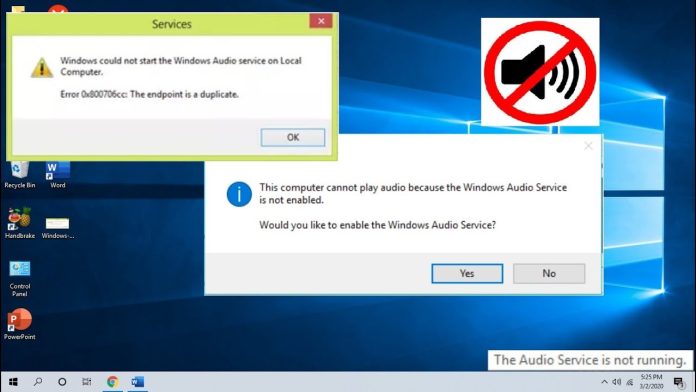The audio service in computers is a necessary service that is needed for doing multiple works. Whether you are gaming, attending virtual meetings, editing a video, or doing your other work, you need the proper audio service on your computer. But sometimes, due to several reasons, the audio service of your computer can stop working.
What can be the probable reasons behind audio service not running on computers?
There can be several reasons behind it which includes:
- You are using outdated or incompatible audio drivers
- You have a corrupt service file for running the audio service on your computer
- Your service file is under malware or virus attack
- You are facing hardware malfunctioning
Sometimes, this issue can also occur when you update your Windows, and in that case, users need to reset the entire computer to restore the sound.
There are several probable reasons behind this issue, and there are many troubleshooting methods available as well. You can use those methods to solve audio service problems on your computer.
What Is the Windows Audio Service?
Before moving further with this article, let’s know what exactly the Windows audio service is. It is nothing but a Windows function that runs the audio devices. If anyhow, due to any reason, this service does not work on your computer system, there will be no sound coming out of your speakers. The primary step to solve this issue is always checking the service area and ensuring that this service is turned on. If due to any reason, the service is broken or damaged, this method will not work.
This service is supposed to start automatically without any manual interruption when you start your computer. Sometimes, it fails to do so, and in that case, you have to change your settings or ensure the workability of your drivers.
How to Fix Audio Service Not Running
There are several troubleshooting methods to solve this issue, but before moving on with the complex troubleshooting methods, first, you need to check the basic things and make sure that all the basic settings are at the point.
First, make sure that your computer’s audio is not muted manually
Go through the volume slider and ensure that the slider is at a hearable point
If you are having this issue with your headphones, make sure you have plugged the headphone into the correct port.
Right-click on the volume icon that you will find on the taskbar and run the sound troubleshooter option. This option can help you solve all the basic problems related to your computer’s audio system.
Restart your computer as sometimes this kind of issue can happen due to some technical glitches that a simple restart can solve.
If you are done with all these basics and still having the same issue, here are the complex troubleshooting methods you can opt for.
Configure Windows Startup Selection
Usually, the Windows system automatically starts all the drivers and services when you start up the computer but sometimes, it can fail. In that case, your audio service would not start properly. You can follow the below steps to start the services when the Windows system starts on your computer.
First, press the Windows key + R key to run the dialogue box on your screen
Type “msconfig” in the box on your screen and press the OK button
Under the Startup selection, select “normal startup” on the general tab
Click on Apply and then Ok
In the same window, you can see the services tab. Click on that.
Check the boxes corresponding to Windows audio and RPC mapper.
Click apply and ok
Run SFC Scan
The system file checkers will help you find the issues that may have occurred in your Windows installation. This system checker not only locates the problem but also solves them on its own. When you have any issues with your driver system or other Windows essential functions, you can run this service to eliminate that issue. Follow the steps here to do that.
Click Windows key + X
Now, you’ll need to choose Windows PowerShell (Admin)
Click Yes
Type “sfc /scannow”
Press Enter key
The process can take a while, and you have to wait without doing anything on your computer in the meantime.
Once the scan is done, follow the prompt on your computer screen to correct the error.
Restart Windows Audio Dependency Services
All the services on your computer depend on several other services to run smoothly. For the Windows audio service, the other services are remote procedure call or RPC, DCOM server process launcher, endpoint mapper, and Windows audio endpoint builder. If, anyhow, these services are not working properly, you can face the issue. That’s why, before starting your Windows audio, restart all these services. Follow the steps below for that
Press the Win Key + R and run the search box
Type “service.msc” in the box
Search for Windows Audio from the list and double-click on it to open its Properties window
Here you will find the Dependencies tab. Click on it.
On the Windows services window, search for remote procedure call or RPC and double click on it.
You’ll see the general tab where you have to set up the startup type to automatic.
- Repeat the same procedure for the other services that are
- Endpoint Mapper
- DCOM Server Process Launcher.
- Audio Endpoint Builder
Start Windows Audio Service
If your Windows audio service is not running on your computer, it can indicate that your audio software is not able to communicate with the sound card. When you start Windows audio, it will re-establish the communication between the sound card and the software for the proper outcomes.
Press the Windows logo key + R to launch the Run box
Type “services.msc” in the box
Now, you’ll need to click on Windows Audio and Restart
Right-click on Windows Audio and select Properties
Change the Startup Type of Windows audio to Automatic
Click on Apply, followed by clicking ok.
Now, restart the Windows audio and double-click on Windows audio.
You’ll be able to see the log-on tab on your screen
Here you will be able to see the option named “this account box”, clear everything from there and click on browse.
A pop-up menu will be appeared on your screen where you have to type “local services” into the section where you are asked to enter the object name.
Click OK
Then, click on apply, and your system will automatically generate a password.
Sometimes, your computer’s sound system may not run on the appropriate system. For setting the Windows audio on the proper system, follow the steps mentioned below:-
- First, double-click on the Windows Audio
- Click on the “Log on” tab. and click on browse.
- Tap on advanced, followed by clicking on the find now option.
- Select the appropriate username and click ok.
Update Audio Device Drivers
Your Windows audio system can malfunction if you have outdated audio device drivers. An audio driver update can solve your issues. Follow the below steps for doing that:-
First, click on start menu and select device manager
Now, expand the sound, video, and game controllers category
Next, right-click on your audio device and select properties.
Click on the driver tab, followed by clicking on the update driver option.
Search for the updates online, or you can also manually install them from downloaded drivers.
Note – In some cases, you may have to uninstall the device from your computer and then reinstall it.
Driver Rollbacks
Sometimes, in rare cases, the updated versions can be damaged, and in that case, you need to get back to the previous version of the driver. Follow the steps mentioned below for doing that.
First, open your device manager and right-click on an audio device.
Choose properties
Now, click on the driver tab and choose the rollback driver option.
You’ll need to choose a reason for rolling back
Now, click yes, and again, click yes when the update is completed.
Your computer will now restart
Note– if you see that the button is greyed out and you cannot access that button, it means that the older version is not available on your computer. In that case, you will need to manually find the older version from the manufacturer’s website and install it on your computer. Once the process is done, go through the steps mentioned above and see whether the issue is solved or not.
Try Log On Settings
For some people, this trick worked successfully, but if, in your case, this does not work, you have to change the settings to what they were before you started this troubleshooting method. Follow the steps mentioned below:-
Enter in your computer as an administrator as this process only can be done on the administrator account.
Press Windows key + R, and in the dialog box, type “services.msc”.
Now, right-click on Windows audio endpoint builder and choose properties from there.
Choose the startup type to disable and click on the apply button.
Open the log on tab there and click on “this account”.
You must type local service and enter your Windows password in the local text box.
Click on apply, followed by clicking on Ok.
Now, right-click on Windows audio and disable the startup type, followed by changing the log-on option like you did with the Windows audio endpoint builder.
Now, restart your computer and change the Windows audio and Windows audio endpoint builder services so that they can start automatically when you start your Windows
Check whether this worked or not, and if it did not work, you have to change the log on entry to the previous settings.
Repair Windows
If nothing works for you, you can try to repair your Windows. If your Windows cannot start the audio service successfully, it can stop at a certain point. And if you have an error in your Windows, your audio service can stop even if you successfully do other methods. Follow the steps mentioned below for repairing your Windows:-
Go to your account login screen and press the power button on the screen.
Keep holding the shift key on your keyboard and press restart.
An advanced startup option menu will appear on your screen where you have to click on troubleshoot.
Now, click on advanced options, followed by clicking on startup repair.
Windows will now automatically do the startup repair process, and you have to wait during this meantime. Don’t try to do anything on your computer during that time, and do not force shutdown your computer.
Once it is done, check whether the issue is solved or not
Update Windows OS
If you still face the same issue, try to update your Windows operating system, which will automatically update your audio drivers. Follow the steps below for doing that:-
- Click on the start menu and select the settings gear.
- Select update and security option and click on “check for updates” option.
Note -( before doing this troubleshooting method, you have to make sure that you have backup of everything on your computer. You can also reset your computer from the advanced setup options menu by following the same process you have used to repair Windows. It is always a better option to wipe out all the data from the disc on which you are willing to install the operating system.)
Now, let’s discuss some audio-related errors in Windows that users can encounter for several reasons.
Audio Service Error 1068 and Audio Endpoint Builder Error 126
If you can see an error message on your computer which is “Audio Service Error 1068” or “Audio Endpoint builder error 126,” follow the methods mentioned below
Restart Service
- Press Win Key + R to open the dialog box and type “services.msc.”
- Start audio service and audio endpoint builder service
- Restart your computer
If you still have the same error message on your computer screen, follow the next method mentioned below.
Registry Editor
Press Win Key + R again to open Run and type Regedit followed by pressing the enter key.
Now, expand the “HKEY_LOCAL_MACHINE” folder.
Then, expand the “SYSTEM” folder, followed by expanding the “ControlSet001” folder.
Lastly, expand the “Services” folder.
Navigate to the “Audiosrv” and click on it.
Go to the right corner of your window where you can see the file named “DependOnService,” right-click on it and then select the modify option.
Now, you will be able to see a pop-up option on your computer screen where you have to delete everything except “RpcSs.”
Click OK
If still, the error message doesn’t go away, follow the next method
Editing CurrentControlSet002
Press Win Key + R again to open Run and type Regedit.
Press enter key
Now, expand the “HKEY_LOCAL_MACHINE” folder.
Then, expand the “SYSTEM” folder, followed by expanding the “CurrentControlSet002″ folder.
Lastly, expand the “Services” folder.
Navigate to “Audiosrv” and right-click on it.
At the right corner of your window, you will see the “DependOnService” option, right-click on that.
Now, select the modify option, and from the popup menu, you have to delete everything except “RpcSs.”
Click OK
Editing CurrentControlSet
Press Win Key + R again to open Run and type Regedit.
Press enter key.
Expand the “HKEY_LOCAL_MACHINE” folder.
Then expand the “SYSTEM” folder, followed by expanding the “CurrentControlSet” folder.
Lastly, expand the “Services” folder.
Navigate to “Audiosrv”.
On the right side of the window, you will notice “DependOnService,” right-click on that and select the modify option.
Delete everything from the popup menu except “RpcSs.”
Click the OK button
Audio Service Error 0x80070005 Access Denied Windows 10
It is a Windows audio service error that is encountered on Windows 10. This error says you don’t have permission to use the audio service. Follow the methods to troubleshoot that:-
Windows Audio Service
First, you’ll need to type services into the Windows search box followed by pressing the enter button.
Navigate to Windows audio services and choose properties by right-clicking on that option.
Click on log on, followed by clicking on “Local System account.”
Check this option – “Allow service to interact with desktop.”
Click on the Apply button followed by clicking on OK.
Leave the service window open after completing the steps and try to restart the service. Then, follow the procedure mentioned below.
Windows Audio Endpoint Builder Service
Now, you will need to search for Windows audio endpoint builder and choose properties by right-clicking on that.
Click on Log on followed by clicking on “Local System account.”
Then check this option – “Allow service to interact with desktop.”
Click on Apply and then Ok
If no single method works for you, follow the advanced method mentioned below.
Editing Windows Registry Editor
Any changes in the Windows registry can affect the operating system as this is used to edit the databases of different services and applications. Follow the steps mentioned below for doing this procedure:-
Open the windows search box and type “Regedit”.
Select the App Registry Editor.
Navigate to – location Computer\HKEY_LOCAL_MACHINE\SYSTEM\CurrentControlSet\Services\Audiosrv.
Now, you will be able to see Audiosrv on your screen. Right-click on that and select permissions.
Click on Add
At the bottom left corner of the popup window, you can see the advanced option. Click on that, followed by clicking on the find now option.
Navigate to the system and select it, followed by clicking Ok
Now, you have to allow full control in the permissions for SYSTEM, followed by clicking OK.
Lastly, you have to repeat the same process for administrator accounts as well.
Now, restart the services and restart your device.
Windows Audio Service Stuck at “Stopping”
It is the last error that we will discuss in this article. For troubleshooting this error, you can follow the steps mentioned below:-
Go to the windows search box and type command.
Run it as administrator by right-clicking on the common prompt
The user account control menu will now appear on the screen where you have to click yes.
Type “sc queryex Audiosrv” followed by pressing the enter key.
Make sure to note the PID value on the prompt.
Type this command – “taskkill /f /pid 1234” (make sure to enter your PID).
Press enter and restart the services.
If the above-mentioned method fails to solve your issue, follow the below steps:-
Press “Win Key + R key to open the dialogue box and type services.msc.
Press enter
Now, double click on the audio service and ensure that the startup type is automatic.
Make sure that the “path to executable” has no file corrupted.
Restart the device and check whether the issue is solved or not.
Ending words
Hope the above-mentioned methods worked for you and that you have successfully solved the audio issue on your Windows.
Experiencing difficulties with your Device, check out our “How To” page on how to resolve some of these issues.














